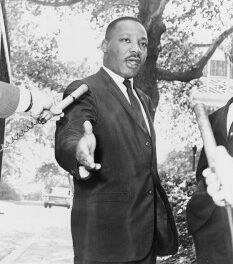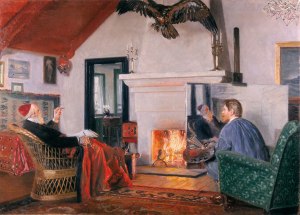We support our Publishers and Content Creators. You can view this story on their website by CLICKING HERE.
Our modern urbanised arrangement of vast groups of human beings—in which the city is master and the country servant—organized through tokens (money) rather than through realities—are undeniably the proximate occasion of war.
Old Principles and the New Order, by Vincent McNabb, O.P. (224 pages, Cluny Media)
“Jesus…seeing the city wept over it saying: If thou hadst known and that in this thy day, the things that are to thy peace. But now they are hidden from thine eyes… And entering into the temple He began to cast out them that sold therein and them that bought, saying to them: It is written: My house is a house of prayer. But you have made it a den of thieves” (Luke 19:41–46).
The Apostle James has written: “From whence are wars and contentions among you? Are they not because of your concupiscences which war in your members? You covet and have not. You kill and envy and cannot obtain. You contend and war and you have not because you ask not” (James 4:1–3).
St. Thomas Aquinas has written: “Peace ceases when all seek what is their own.”
An intelligent observer of modern social movements has said: “Some men wrest a living from Nature and it is called work. Some men wrest a living from those who wrest a living from Nature and it is called trade. Some men wrest a living from those who wrest a living from those who wrest a living from Nature, and it is called finance.”
“Seeing the city.” The tears of Jesus were never shed at the sight of the countryside. The divine Woes were uttered against Corazain and Bethsaida, the divine Doom was foretold of Capharnaum and, with tears, of Jerusalem.
His choice of Bethlehem rather than Jerusalem for birth, and of Nazareth rather than Jerusalem for life, suggests the motive of those tears. That motive is seen more clearly when we realize that the Redeemer who passed over Jerusalem for birth and life chose it only for death.
There is one City of Peace, but it is the Heavenly City. Here on earth we have no abiding city; and no peace-abiding city.
The country if not divinely organized for peace is more organized for peace than for war. But the city if not humanly and deliberately organized for war is more organized for war than for peace.
A hundred facts show plainly enough how the country rather than the town is organized for peace, and the town rather than the country is organized for war.
But of these hundred facts one seems not only necessary but essential. In outline it is as follows. Only the country and nowise the town is self-sufficient. In other words, if one person dwells in the town, one person must dwell in the country. One town-dweller demands one country-dweller; although one country-dweller does not demand one town-dweller.
There is an economic sense in which the town-dweller is parasitic on the country-dweller. But there is another political sense in which the town-dweller is less parasitic than despotic.
The town-dweller must and does contrive to exert pressure upon the country-dweller. Now, it will be found immediately on examination that the town-dweller’s will can be imposed upon the country-dweller only by untrue values (the equivalent of fraud) or by unjust pressure (the equivalent of force). If this state of fraud and force is not war, it is what moralists call fitly the “proximate occasion” of war.
Only the Prince of Peace, whose birth-place was not a city but a hamlet, said: “I came not to bring peace but the sword.” How courteously is this said! The Speaker contrives to suggest that He came almost as a Muhammad to use the sword for bringing the whole world under His sway. Yet it was not He who unsheathed the sword against us. It was we from our city and citadel that unsheathed the sword against Him!
The simple country folk said: “Come let us go over to Bethlehem and see Him.” The Jerusalem city folk sent their officers to find Him and kill Him!
We must not hastily condemn these city folk, nor their King Herod. Every city, as Aristotle says, has peace for its end and aim. Even when it makes war it is making war for peace’s sake. No doubt the people over whom Herod reigned in peace had suffered so recently and so much from war that peace could hardly be bought at too great a price. If by the death of a few village children (of whom there were enough for trade) civil war could be prevented, their slaughter could not be looked upon as aught but far-sighted statesmanship.
In other words, the city with its false views of what was really “to its peace” was the proximate occasion of that contempt for human life which is the motive of the most inhuman wars.
“Urbi et Orbi.” So ran the decrees of imperial Rome: to the city first and then to the world, because the world was for the city; and not the city for the world.
There was a social quality much coveted by the “lucky” citizen of Rome, and called pax romana, Roman Peace.
Like every kind of peace, it was the effect of victory. Yet it was at best only the lower peace based on victory over others; and neither the noble peace based on victory over self, nor the noblest, Christ-like peace by sacrifice of self.
Two things allow us to see in the degrading nature of this Roman city-peace the tendency of cities to impose their will by fraud (untrue values) or by force (unjust pressure). One fact is the destruction of Jerusalem; the second fact is the construction of the Colosseum. The Holy City was destroyed by fire and sword. Its fires were almost quenched by blood.
A few years later, when thousands of Jewish war-captives had built a Colosseum for Roman games, human blood was shed as freely for Roman pleasure as ever it flowed through Roman hate.
After the manner of all peoples whom war has enriched, Rome disliked war and sought peace.1 But this dislike for war merely meant that Rome preferred receiving something gratis to buying it at a price, especially at the price of Roman blood. During the centuries of its supremacy Rome’s principle was: Parcere Subiectis et debellare Superbos. Those who did the will of Rome and became its slaves were compensated by a secure sufficiency of worldly goods. Those who refused to do the will of Rome were war-beaten till their refusal or their life was at an end; and the Roman Eagle was again at peace!
“Peace ceases when all seek what is their own.” In laying down this social principle so epigrammatically that it seems almost a paradox, St. Thomas was no doubt recalling the words of St. Paul. To the self-opinionated Corinthian Greeks were written the words: “Let no man seek his own; but that which is another’s” (1 Cor. 10:24). To the socially proud Macedonian Greeks, fellow-countrymen of Alexander the Great, were written the words: “Let each esteem others better than themselves; each one not considering the things that are his own, but those that are other men’s” (Phil. 4:3, 4). For these Southern and Northern Greeks St. Paul’s invitation to the divine Pax Christiana, Christian Peace must have sounded like a declaration of war! They could not be expected to know at once that it was an invitation to that victory over self which alone can beget lasting and perfect peace.
St. Thomas had arrived at his doctrine of peace by meditating, not only on peace, but on the causes and hindrances of peace.
Though justice is a virtue enabling us to give others all that is theirs, it could be only the accidental (or hindrance-moving) cause of peace.
The only direct and essential cause of peace is charity, because charity is a virtue enabling us to give to others not only all that is theirs, but also something that is ours. Psychologically speaking, and as man is now found, only the motive or momentum of charity will set justice in motion.
Now psychologically speaking, and as man is now found, no men or group of men when seeking their own rights will be able to see the rights of others. Hence no man or group of men will be able to practice that justice without which peace is impossible.
A State in which each and all seek their own rights will be very effectively the Darwinian struggle for existence; or in Marxian language, “class war.” But it will be war—and not peace.
For all these reasons, latent in the principle of St. Thomas, we find ourselves with nothing but compassion for the multitudes, because peace can now be only a by-product of the modern urbanized activities to which these multitudes are directed or constrained. Everywhere the direction or government of peoples is passing as by right into the hands of the trader, whose power is through money, or of those financiers, whose greater power is over money. Yet even the most well-intentioned trader-statesman or financier-statesman will think it his first and greatest duty to his country to defend the rights of its citizens. But if peace ceases when men seek what is their own, modern statesmanship will tend always to be war or the threat of war.
To sum up. Our modern urbanised arrangement of vast groups of human beings—in which the city is master and the country servant—organized through tokens (money) rather than through realities—are undeniably the proximate occasion of war.
And modern machine-made war is mass production of commodities followed by mass destruction of men.
Et in terra pax hominibus bonae voluntatis.
This essay is an excerpt from Old Principles and the New Order. Republished with gracious permission from Cluny Media.
Imaginative Conservative readers may use the code IMCON15 to receive 15% off any order of not-already discounted books from Cluny Media.
The Imaginative Conservative applies the principle of appreciation to the discussion of culture and politics—we approach dialogue with magnanimity rather than with mere civility. Will you help us remain a refreshing oasis in the increasingly contentious arena of modern discourse? Please consider donating now.
The featured image is “Women Going to the Woods” (1866) by Alfred Sisley, and is in the public domain, courtesy of Wikimedia Commons.

 Conservative
Conservative  Search
Search Trending
Trending Current News
Current News 





